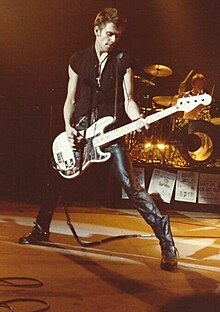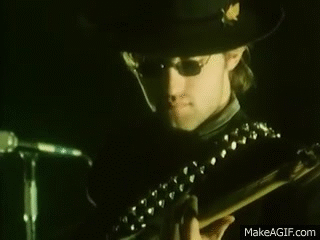As a bassist in a band, it is important to study bass through the songs of the genre you cherish most. Here are the bassists and songs that got me to pick up the instrument… and the songs that earn continuous respect. Most of these are circa 1979, but so are most of my favorite albums. I provide this as a recommendation to bassists or punk fans interested in the instrument. This is only a short list of my favorite bassists on what I opine to be the albums that best exemplify their skill. There are many more epic punk bassists out there waiting to be appreciated, and some notable songs by other punk bassists are highlighted at the end.
Paul Simonon
The Clash - Sandinista! (1980)
“Overpowered by Bass”
Paul Simonon is the most versatile and groovy bassist in punk. This massive triple album is full of gems that are a testament to Simonon’s mastery of the instrument. Get to know the album, and you will be rewarded. Paul Simonon’s reggae influences are prominent on this bad boy. As 36 songs is too much to handle, we’ll stick to the favorites. On the opening track “The Magnificent Seven,” if every part of the song wasn’t tight enough, the bass groooooves. The Clash’s reggae cover of an old blues song “Junco Partner” has looping bass that has made the song my new obsession. As for “Lightning Strikes (Not Once But Twice),” the bass slaps. You want to dance, there it is. Makes a good partner to Mag 7. “The Crooked Beat,” is a follow-up to London Calling’s “Guns of Brixton,” with Simonon taking lead vocals, singing about a reggae club. It’s a good trio with “Living in Fame” and “The Equaliser,” whose bassline alternates its strumming patterns on verses and chorus, and it's fun to play. These two songs have catchy bass that makes you sway. “The Call Up,” like Junco, has a looping bass that locks you into the whole song. It’s one of those two-chord drone songs that goes on for over five minutes that I love which demands improvisation and several verses to explore its musical idea to the limit. It’s the type of song that gives you focus, and time to think. Watch the music video, it’ll hypnotize you. And you’ll see Paul Simonon really get into it in a cowboy hat, bandana, and boots with a holstered pistol flapping at his hip. It’s one of the cooler get-ups if you know what I mean… Mick and Topper really didn’t luck out… or coordinate well… Right. Let’s not forget “Charlie Don’t Surf,” that reggae-surf Sandinista! classic. That start-stop rhythm that surfs in places, rolls in others. As if you weren’t already about soothed to sleep, this is followed up by “Junkie Slip” with a bizarre hopping whamp whamp bass with an 80s reverb going on. “Kingston Advice” has this downbeat wobble below the vocal melody that’ll keep the song impressed to the back of your mind well after you’ve listened–and get you hyped just when you were winding down from a punk album of epic proportions and bass expertise. And speaking of Wobble….
Jah Wobble
Public Image Ltd - Metal Box/Second Edition (1979)
“Bass Heaven”
As if Public Image Ltd’s first album didn’t already majorly contribute to me buying a bass in the first place, PiL’s second album achieved an unfathomable new level of bass bliss. The bass in the first two PiL albums Wobble plays on is turned way up in the mix. You can’t miss it. Wobble really improved those improvised grooves, and they command the album. The first track “Albatross” was done in one take, improvised like much of the album. The bass takes over in a loop for about ten straight minutes. If you don’t have the time, there’s “The Suit”–just bass and drums, and it rolls along the ground with fast strumming that earns Wobble his name. Wobble said he was proud of “Poptones” because it had a perfectly symmetrical bassline. Its serene progression could soothe you to sleep. I loved it enough to name my radio show after it. The closing track “Radio 4” was composed entirely by guitarist Keith Levene, who attempted to emulate Wobble on the bass. He succeeded, and he deserves credit here too. The two instrumentals “Socialist” and “Graveyard” have this spooky bounce to them that befits them for a Halloween party. Dub influence is present. The album is called Metal Box due to it being originally packaged in a steel casing but was retitled Second Edition in 1980 when it was repackaged in a conventional paper sleeve. The first time I heard Second Edition straight through, I called it bass heaven. Indeed.
Tessa Pollit
The Slits - Cut (1979)
“I heard it through the bassline” - Ari Up
For those who’ve never heard of The Slits, note they were #27 on Kurt Cobain’s favorite 50 albums list, which is a good place to start if you’re looking for more 1980s punk artists to listen to. They took no lessons. They heard punk and decided, “Let’s play.” The result is this wobbly reggae-influenced punk album epicness. “Instant Hit” and “So Tough” are the perfect examples of that genre fusion, with its heavy bouncy rhythm making its own way, separate from the guitar and drums. Tessa Pollit’s bass makes multiple patterns throughout the songs, giving the album a dynamic groove. “Spend, Spend, Spend” starts with that low reggae roll at the beginning and slides around during the pre-chorus, makes a third pattern next verse, and even changes key a few times. This bass is anything but dull. “Shoplifting” has fast wind down start stops. “FM” standing for “Frequent Mutilation,” and “Newtown” have a downbeat bass, a moody change from the earlier tracks. “Ping Pong Affair” has its own voice. “Typical Girls” steps away from the center, but has a low reassuring roll to keep the song steady. Typically, Pollit’s bass leads the song. She is the backbone of the album that the other musicians depend on. This is the bassist’s job. Atypically, rather than solely relying on bass for the tempo and rhythm, on Cut, the other musicians work around it, complimenting the bass. Ari Up, The Slits iconic vocalist sums it up quite well on a bonus track to Cut, a reggae cover of “I Heard It Through the Grapevine,” singing, “I heard it through the bassline.”
Peter Hook (“Hooky”)
Joy Division - Unknown Pleasures (1979)
“Rampaging bass lust” - Paul Morely
Who needs a lead guitarist when you have a lead bassist? The classic opener Disorder has that signature Hooky style where he alternates hitting lower notes before switching to a high one on the top string of his bass. In the Collector’s Edition booklet to Joy Division’s final album, Closer, its writer Paul Morely had this to say: “If you imagine the four musicians in a room, Hooky stood firm and defiant in the centre of the room, oblivious to everything except his own rampaging bass lust.” I think it’s even more obvious on Unknown Pleasures. Take the wild swings and beat of “Wilderness” for example. Peter Hook drives the sound. According to the band, lead singer Ian Curtis would listen to the musicians play random notes and pick certain lines out that the band didn’t realize they were playing. This explains why those melodic basslines sound like something you dream up on the edge of sleep. “Candidate,” however, was written with Curtis out of the room, and it’s my favorite bassline on the album. I prefer the live version which has a louder bass sound. The bass creates the melody instead of the guitar. “Insight” is one of those iconic melodies that I want to hum in my sleep. Hook likes jumping to those high notes on the bass and creating the center melodies to songs, unique to not only Joy Division’s sound, but basslines in general.
Carlos Denger
Interpol - Turn On The Bright Lights (2002)
“Basslines to Cry to”
No, they’re not punk, but you can’t tell me they weren’t inspired by Joy Division, and bang, therefore they have (post-)punk influences. Even Morrissey of The Smiths was president of the New York Dolls fan club. *Ahem.* Interpol’s first two albums sound like a cross between The Strokes and Joy Division, which makes a tasteful combo. And like both of those bands, Interpol is equipped with strong basslines throughout thanks to Carlos Denger. The album Turn on the Bright Lights is a powerhouse of bass. One of the reasons I picked up a bass is because I really wanted to play these bass lines, and never mind that I didn’t. This album begins with heavy melancholy bass on Untitled, which speaks for the whole album. Standout tracks include “Obstacle 1,” “PDA,” “Obstacle 2,” “Say Hello to the Angels,” and “The New.” But really, what song doesn’t have awesome bass? Basslines to cry to. One of the few upbeat songs, (besides “Say Hello to the Angels”) “Roland,” was featured in a remake horror movie House of Wax. Pretty fitting since the track’s about a potential serial killer, but honestly, most of these songs have subtly creepy lyrics. You hardly notice, focusing on the serene and moody bass. The lead singer Paul Banks has since taken up playing bass in Denger’s stead when he left Interpol. (tear) Not included on this album is that killer notorious song “Evil” off their second album, Antics, with possibly Denger’s best bassline ever. If you have a fear of puppets, don’t watch this music video. A mere screenshot of it on Wikipedia stalled me from listening to them for years until I had recovered from the trauma to relisten to the song. Yes, the puppet is terrifying. Yes, I watched it. I don’t recommend the same to you.
Other Notable Bassist Mentions
Dave Riley (Big Black)
You’ve probably never heard of this Chicago-based band from the eighties. Extreme punk-industrial with the mission to expose the dark side of American culture. Log splitting bass. Demolition rhythm. The sound of impact, if you will. Brace yourself.
Tina Weymouth (Talking Heads)
Simple but effective. Weymouth had to know the bassline of Psycho Killer would instantly identify the infamous song for anyone who’s ever heard it even once. They’re so memorable that I usually remember the songs by the bass rather than the guitar, as the listed examples testify.
Tony Lombardo (The Descendents)
I try, but it’s too fast for me to play. My fingers seize up and I catch three notes before losing it altogether. According to Wikipedia, “[Bill] Stevenson had written the lead track, ‘Myage’, several years earlier using a bass guitar he had found discarded in a trash bin.” Which I guess would make Bill Stevenson, the drummer, the mastermind behind this bass line, and Lombardo the executor. The fact that a second person exists besides the writer who can play this at recorded speed is a massive achievement. Terrifying to imagine playing, a blast to listen to.
Joe Lally (Fugazi)
Waiting Room sounds like a spy theme. It exploded the potential of what punk bassists can do with the instrument. Name one punk bassline that sounds cooler than this.
Andy O’Rourke (The Smiths)
There’s a YouTube video of the Smiths playing this live and NO ONE’S DANCING except those few people frolicking in the back. Well, that should be everyone who’s ever heard this song. The bass in the outro has a rockabilly groove that gets down!!! Being fans of the Smiths, though, most of them were probably too self-conscious to move. Maybe they didn’t want to outperform Morrisey, and the only way to avoid that was to stand perfectly still.
Jean-Jaques Burnell (The Stranglers)
Improvisational flair and strong rhythm. This is only a fraction of the awesome output he’s done. The classic Stranglers era is packed with great bass on every album thanks to Burnell. Any French you hear in a Stranglers song is also Burnell.
Tony Maimone (Pere Ubu)
Some funny avant-garde. Little dub influence. What else can I say? It’s just a joke, mon.
Klaus Flouride (Dead Kennedys)
The members of Dead Kennedys are all so awesome that it helps to listen to tracks with isolated bass to hear Klaus Flouride’s true genius. He has a perfect flavor of weird style that surpasses his stage name. “Night of the Living Rednecks” was IMPROVISED when the guitarist East Bay Ray’s guitar string broke as a little filler between songs. It’s so classic it’s included on the compilation album Give Me Convenience or Give Me Death. Flouride’s bass glides with a little bop at the end of the disturbing epic “Soup is Good Food.” There’s a lick at the end of the second chorus, and the bass takes over the melody for a while to draw even more attention to the lyrics. “We’ve Got a Bigger Problem Now” displays Flouride’s lounge skills before it goes full hardcore punk. This is a man of no small talent. Flouride demonstrates the ultimate bass compliment to guitar in “Moon Over Marin.” In the main riff, the bass provides the melancholy undertone to this classic song as it combines with the guitar chords. At the guitar solo, Flouride grounds the high guitar notes. As the song winds down, Flouride slides and warps his notes until he hits that perfect note to conclude the song, until that funky album outro kicks in, which is weird and awesome. It’s an emotional experience, man. Click the links and listen.
_edited.png)








コメント